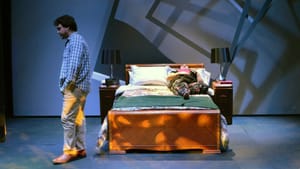Stay in the Loop
BSR publishes on a weekly schedule, with an email newsletter every Wednesday and Thursday morning. There’s no paywall, and subscribing is always free.
Love and marriage
South Camden Theatre Company presents David Schulner’s ‘An Infinite Ache’

South Camden Theatre Company centers its current season around plays with two characters, so a romantic comedy had to be included. Yet what drew the troupe to David Schulner’s An Infinite Ache, a predictable and pedestrian exploration of one couple’s utterly unremarkable relationship, remains a mystery.
If it be thus to dream
Over the course of 80 minutes, Schulner distills the 50-year marriage of Hope (Kimie Muroya) and Charles (Steve Harding) into a series of short scenes that hew to predictable coupledom milestones. The playwright begins with a first date, continues through nuptials and the arrival of children, careens toward hard times and how they’re handled, and concludes where all stories end—that undiscovered country from whose bourn no traveler returns.
Or does he? The one intriguing innovation in Schulner’s script involves a framing device that finds Hope, tipsy from wine after her unpromising first date with Charles, lying down for a quick nap to regain her bearings. (The entire play takes place in the bedroom of a studio apartment, rendered with a dash of whimsy by scenic and lighting designers Robert Bingaman and Joshua Samors.) Charles seizes the opportunity to imagine their lives together. It remains a guessing game whether what we’re seeing about the couple’s future actually came to fruition or not.
Who are they?
Still, the conceit asks, why settle for such boring dreams? Relationships aren’t defined by excesses of romantic grandeur, of course, but one wonders why Schulner chooses to overdose on the quotidian as some sort of statement on the peaks and valleys of a life spent together. At times, Hope and Charles’s travails resemble a standard-issue sitcom (stale sex jokes abound); in other moments, the feeling is closer to movie-of-the-week melodrama. In either case, there’s little here that breaks new ground or adds insight to a well-worn subject.
The script errs in not strongly defining either character outside the bounds of their relationship. Perhaps this is a comment about how it’s possible to lose your identity once you’re part of a pair, but it would read more convincingly if we sensed what makes Hope and Charles unique as individuals. The closest Schulner comes to this is a playful moment near the top, when Hope (who is of Chinese and Filipina heritage) tartly deflects a subtly racist question from Charles (who is white and Jewish) about her background. You’ll have to strain to find that level of sharpness elsewhere in the play.
Commendable actors
The actors generally rise above their material. Muroya imbues Hope with a level of complexity that’s largely absent in the writing. Hope’s tendency toward indecision might seem flighty in lesser hands, but Muroya suggests a searching spirit. Harding’s slouchy charm wrests Charles from the realm of slacker cliché. Both deserve commendation for giving their all to an audience that numbered a mere seven people at the performance I attended.
Despite their strengths, director Raymond Croce could do more to relate what drives the attraction between them. Schulner references the Jewish concept of bashert—a state akin to soulmate—but even as Hope and Charles settle into a comfortable dotage, their long love often feels perfunctory to the point of tedium.
The presence of music before and during the play only serves to underscore this notion. The evening includes a range of songs about the beguiling nature of affection, everything from Ella Fitzgerald to Mumford and Sons. I couldn’t help feeling that each short burst captured the sensation, both passionate and commonplace, far better than An Infinite Ache.
What, When, Where
An Infinite Ache. By David Schulner, directed by Raymond Croce. Through May 18, 2019, at Waterfront South Theatre, 400 Jasper Street, Camden, New Jersey. (866) 811-4111 or southcamdentheatre.org.
Waterfront South Theatre is an ADA-compliant venue. Patrons with questions about accessibility can call (856) 409-0365 during normal business hours.
Sign up for our newsletter
All of the week's new articles, all in one place. Sign up for the free weekly BSR newsletters, and don't miss a conversation.

 Cameron Kelsall
Cameron Kelsall